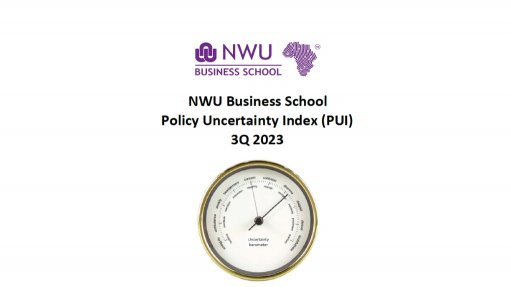
Although remaining well in negative territory, the NWU Business School PUI for 3Q 2023 declined to 71.8 from 76.2 in 2Q 2023 (baseline 50). While several contrary factors kept the PUI elevated, there were apparently enough positive ones to bring the PUI slightly lower over the past three months.
Globally, there is a continued overall slowdown in the world economy. World economic growth is now estimated by the IMF to be about 3% in 2023, and global commodity prices are lower. New uncertainties have arisen around the Chinese economy, with growth there now being forecast to be only about 4% in 2024.
Global inflation in 2023 is expected to fall from 8.7% to 6.8%, but underlying (core) inflation is projected to decline more slowly. The US Fed decided on September 20 to again keep interest rates unchanged but warned that further rises were still possible. The US economy still appears to be the strongest ‘locomotive’ in the world economy.
A positive development in SA was the better-than-expected GDP growth of 0.6% in 2Q 2023. This was allied with stronger high-frequency data for the manufacturing sector in 3Q 2023, encouraging gains in certain confidence indices, and firm evidence of increased private investment in renewable energy.
Inflation is now within the SARB’s 3%-6% target range. At its meeting on September 21, the SARB’s Monetary Policy Committee (MPC) decided by a 3-2 vote on a ‘hawkish pause’ to again keep interest rates unchanged for now.
Another source of potentially positive news was the closer collaboration between business leaders and government to tackle urgent challenges in the crucial spheres of energy, logistics and crime. The successful BRICS summit in August also had a useful business spinoff.
Nonetheless, there is still a high degree of volatility and uncertainty in SA’s current growth dynamics, especially as heavy load-shedding resumed for most of September. Household finances also remain under strain. Another negative factor was the renewed sharp deterioration in SA’s public finances and uncertainty as to how this will be managed in the Medium-Term Budget Policy Statement (MTBPS) on November 1.
Fixed capital formation trends are now looking better, but consumer spending is still under great pressure. The MPC, presently, sees the risks to the growth outlook as ‘balanced’. GDP growth in 2023 will be positive but is still only likely to be about 0.6%. The economy struggles to gain momentum in the face of global and domestic headwinds yet remains surprisingly resilient.
Negative trends like policy uncertainty are reversible and remediable. Stronger economic growth now requires multi-tiered good news on the implementation front, especially on the energy outlook. SA must, therefore, urgently implement the remedies, reforms and growth positives available to promote a stronger economic turnaround in the months ahead.
Report by the North West University Business School